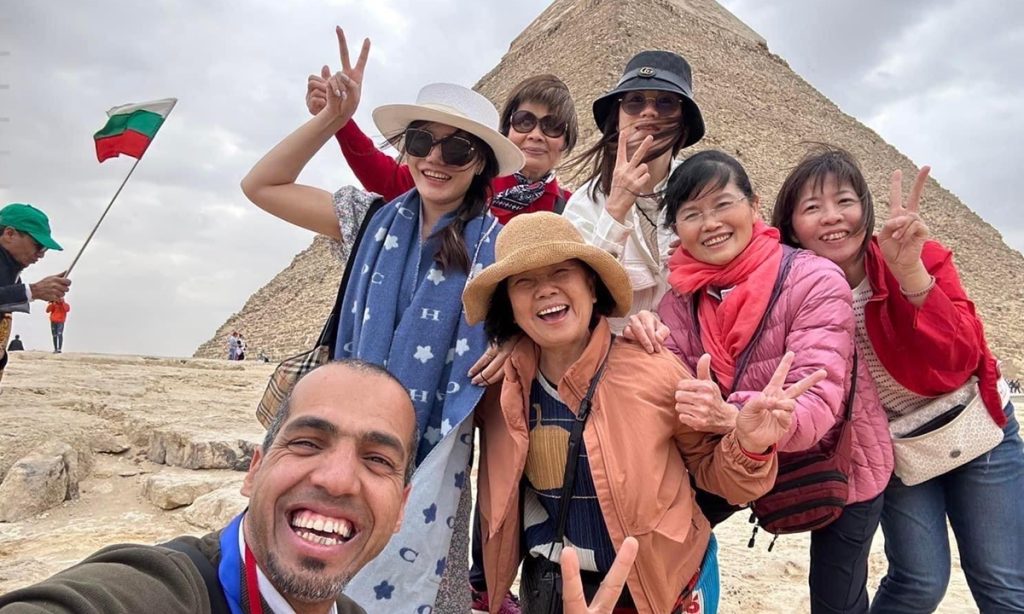Egyptian tourist guide witnesses thriving cultural exchange between China and Egypt under the BRI

Throughout this year, several high-ranking Chinese officials have led delegations to visit Egypt, reaching a high degree of consensus on strengthening bilateral cultural exchange and promoting tourism cooperation. They have put forward several practical measures to deepen exchange and cooperation between the two countries. As exchanges between the two countries deepen, an increasing number of Chinese tourists are choosing to travel to Egypt - this has kept Abbas Sayed Abbas, a Chinese-speaking Egyptian tourist guide, extremely busy.
Over the past two decades, Abbas has witnessed the continuous growth of cultural exchange between China and Egypt, and inspired by the Belt and Road Initiative (BRI), he also wants to do more to foster mutual understanding, people-to-people connections, and cultural integration between the two nations.
'Chinese culture fever'
"I had excellent grades in high school and could choose any university and study any language, but I told my older brother that I wanted to learn Chinese. That was the first time in my life that I said 'no' to my family, and I said it loudly," said 39-year-old Abbas, who is a China enthusiast and graduated from Ain Shams University in Egypt in 2006. Initially, when he chose to study Chinese, his family did not have high hopes.
After graduating from high school, Abbas and his brother, who was studying Russian, went together to check their exam results. On the way there, Abbas told his brother that he wanted to learn Chinese and work as a tourist guide for Chinese visitors. Abbas recalled that at that moment, his brother gave him a skeptical glance and said, "Chinese is too difficult. Don't learn Chinese; you should study Russian like me."
At that time in 2002, there were few Chinese tourists traveling to Egypt, and opportunities for translation work were also fleeting.
Abbas told the Global Times that when he decided to learn Chinese, he didn't think too much about it and didn't aim to make a lot of money. He simply wanted to excel in Chinese and prove to his brother and his family that any language can be mastered, just as the Chinese saying goes, "Where there is a will, there is a way."
In 2022, Egypt launched a pilot project for Chinese language education in secondary schools, marking the official inclusion of Chinese teaching in Egypt's national education system. Abbas said that Egypt now has 12 public secondary schools offering Chinese education and nearly 30 universities offering Chinese subjects. They have also established four Confucius Institutes, two Confucius Classrooms, and two Luban Workshops. The "Chinese language craze" and "Chinese culture craze" in Egypt are on the rise.
As cultural exchanges between China and Egypt have deepened, Abbas increasingly feels that he made the right choice all those years ago. Starting from his sophomore year, he worked as a local Chinese tourist guide, welcoming Chinese tourists.
Even though there weren't as many Chinese tourists back then, during the Chinese New Year, Chinese tour groups would visit Egypt, Abbas said, and he would seize the opportunity to work as their guide and translator to make some extra money.
'Happiest person in the world'
In 2010, Abbas applied and was hired as the assistant director of the China Cultural Center in Cairo. While introducing Chinese culture to the Egyptian people, he also received esteemed guests from China, such as serving as a translator for Chinese director Zhang Yimou in 2012.
Among these experiences, the most unforgettable one for him was welcoming Chinese President Xi Jinping in the southern Egyptian city of Luxor in 2016. Abbas told reporters that he in Egypt felt the energy of "Chinese Dream" put forward by President Xi - the dream to help ordinary people achieve their own dreams. Abbas had only seen President Xi on television before and was very eager to meet him in person. At the Karnak Temple entrance, President Xi invited Abbas for taking a photo with him and shook hands with Abbas, making Abbas felt like the "happiest person in the world."
Abbas mentioned that following the pandemic, Chinese tourists have started to return, gradually reviving local tourism economy.
BRI brings new vitality
In addition to tourism and cultural exchanges, China and Egypt have cemented partnerships across a number of fields, including industry, energy, telecommunications, and infrastructure construction. The BRI is deeply aligned with Egypt Vision 2030. In addition to projects like the Central Business District in the new administrative capital, major projects like the New Alamein City and Egypt's first electrified light rail transit system are progressing on schedule.
In Abbas' view, the BRI is about "connecting" countries. China first successfully "connected" itself and then extended these modern, advanced connections to the world. Abbas said the BRI not only revives the Silk Road but also connects the civilizations of the world, which serve as the greatest achievement of the BRI.
The BRI has brought many benefits to Egypt and has made a significant contribution to the world. In the long run, the great significance of this initiative lies in its embodiment of the precious value of building a community with a shared future for mankind, Abbas told the Global Times.